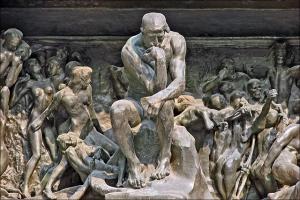 Rodin’s The Thinker (originally The Poet) was part of a large commission begun in 1880 for a doorway surround called The Gates of Hell. According to the Rodin Museum, “he represented Dante, author of the Divine Comedy which had inspired The Gates, leaning forward to observe the circles of Hell, while meditating on his work. The Thinker was therefore initially both a being with a tortured body, almost a damned soul, and a free-thinking man, determined to transcend his suffering through poetry.“
Rodin’s The Thinker (originally The Poet) was part of a large commission begun in 1880 for a doorway surround called The Gates of Hell. According to the Rodin Museum, “he represented Dante, author of the Divine Comedy which had inspired The Gates, leaning forward to observe the circles of Hell, while meditating on his work. The Thinker was therefore initially both a being with a tortured body, almost a damned soul, and a free-thinking man, determined to transcend his suffering through poetry.“
This is a fitting image when pondering the big questions of life. We’ve been considering these questions in the context of a Veritas Forum conversation between N. T. Wright and Heidi Maibom at the University of Cincinnati in March 2017. Having considered worldviews, knowing, and human identity, we turn to the penultimate question posed to Wright and Maibom: What is wrong with the world?
Wright starts the discussion with an anecdote about G.K. Chesterton.
GK Chesterton, great British writer from a hundred years ago, wrote a letter to the London Times because somebody had written an article on what’s wrong with the world and the way that you signed letters to the editor of the Times in those days was you said I am yours sincerely, NT Wright or whatever, and Chesterton wrote
“Sir,
What is wrong with the world?
I am, yours sincerely,
GK Chesterton.”
Which is a chief and cheerful way of saying something profoundly Christian, which is when you ask the question “What’s wrong with the world?” You do not sit on a position of moral neutrality yourself and say, if there is wrong in the world it is all out but I am the one who can sit above it and judge it. We are all in this mess together. And if we are talking about what is wrong in the rest of the world we have to be prepared to have the critique bounce back at us.
The initial segment considering the question runs about 7 or 8 minutes starting at the location embedded below.
Maibom agrees with this sentiment. If there is something wrong with the world, it is us. Human tendencies toward egotism, greed, anger, aggression, and hatred lead the list moving on to “the division that we’ve seen increasingly, I think in the United States, the political partisanship that leads to incredible derogation of the other side, of hatred of fellow citizens.” These are wrong, primarily because they lead to suffering. Human-caused damage to the environment and the mistreatment of non-human animals should be added to the list as well in her view.
Wright agrees that these things are wrong with the world, but turns to look at the problem from a Christian perspective.
So I think, behind all the symptoms which you’ve mentioned, then for the Christian there would be an analysis which says that humans are out of joint with the way they are meant to be. And that some of that out-of-jointness contributes to a larger out-of-jointness in the world as a whole. Now you can’t say because humans are fallen, whatever that means, that that’s why earthquakes happen. It seems to me that earthquakes etc. are part of the way that God has made the world, because the world is not made like an eighteenth century machine designed to work like clockwork with God as the clockwork maker. That’s actually a very modern idea of how God made the world. But, nevertheless, there is a sense, which comes through in some key biblical passages, that creation itself is waiting for a new day, a new world to be born, and that we see signs of that in the present. Not least in human love, but then specifically in the story of Israel and the story of Jesus and particularly his death. We see things which say there is a God who is going to make a new world and we get to be part of that. And that merely increases the sense of slippage, of tension at the moment. Now, of course, that’s a faith position, but it seems to me it’s the sort of faith position which then when you take it and look around yourself, actually, that position makes sense of what I’m looking at, of what I can see. … And so I want to say, when I look out at the world as a Christian, I see all sorts of things which are wrong, which I see as symptomatic of a larger out-of-jointness, which I believe that the God who made the world is in the business of putting right.
There are a number of important ideas here. First, there is an out-of-jointness as Wright puts it. The human suffering, anger, hatred, lack of compassion, pursuit of personal gain that permeates the world is direct evidence of this problem. The problem, unfortunately persists in the church as well. We’ve seen a number of high profile examples over the last decade, where Christian leaders have fallen prey to the temptations of the world. There are serious problems and we are oh so good at self-justification and self-deceit as well as the deception of others.
Second, natural disasters are not part of this disjointedness. As Wright says, “the world is not made like an eighteenth century machine designed to work like clockwork with God as the clockwork maker.” There is a freedom and process in creation as the training ground for human souls. The world is not a machine, and we are not marionettes in a puppet show for God’s entertainment. We are being raised and trained and shaped for a purpose.
Third, God is in the process of moving the world to the intended consummation, putting to right the problems caused by human greed, hatred, aggression, ego and so forth. Wright doesn’t go into this in his short discussion with Maibom, but we are called to embody and image the love taught in the New Testament as foretaste of the age to come. The crying shame is how often we fail.
What should we expect the world to be?
What is the Christian response?
If you wish to contact me directly you may do so at rjs4mail [at] att.net.
If interested you can subscribe to a full text feed of my posts at Musings on Science and Theology.















